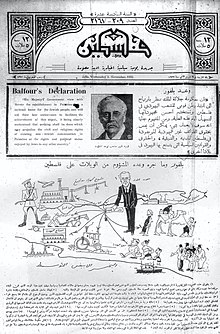Concessions in Mandatory Palestine
The Concessions in Mandatory Palestine were a number of monopolies for the operation of key economic assets in Mandatory Palestine.[1][2]

Front page of the Arabic newspaper Falastin on the 15th anniversary of the Balfour Declaration, 2 November 1932. The Jordan River Concession is shown in the top left corner of the cartoon (Arabic: مشروع كهرباء روتنبرغ, romanized: Mashrue Kahraba' Rutenburgh, lit. 'Rutenberg Electricity Project'), and the Dead Sea Concession is shown in the top right.
List of Concessions
The 1938 Woodhead Commission provided a list of the concessions granted:[3]
Bodies of Water
- the Dead Sea Concession (Moshe Novomeysky's Palestine Potash Company)
- the Jordan River Concession (Pinhas Rutenberg's Palestine Electric Corporation and the First Jordan Hydro-Electric Power House)
- the Jerusalem Electric and Public Service Corporation (Euripides Mavrommatis; sold to Balfour Beatty in 1928)[4]
- the Auja Concession (the Palestine Electric Corporation)
- the drainage of Lake Huleh and the adjacent marshes (the Palestine Land Development Company)
Oil transport
- the Transit of Mineral Oils through Palestine and the Establishment of an Oil Refinery at Haifa (Anglo-Iranian Oil Company) ;
- the Transit of Mineral Oils through Palestine (the Iraq Petroleum Company).
Shipping infrastructure
- Lighthouses (Administration Generale de Phares de Palestine);
- Bonded Warehouses (Levant Bonded Warehouse Company);
Spas
- the Tiberias Hot Baths (the Hamei Tiberia Company);
- El Hamma Mineral Springs (Suleiman Bey Nassif);
gollark: <@129553195314839552> You want this with better input validation basically.
gollark: ```javascriptconst dns = require("dns2")const fetch = require("node-fetch")const { Packet } = dns;const server = dns.createServer(async (request, send, rinfo) => { const response = Packet.createResponseFromRequest(request); const [ question ] = request.questions; const { name } = question; if (name.endsWith(".kst")) { const nameWithoutExt = name.replace(/\.kst$/, "") const kstName = await (await fetch(`https://krist.ceriat.net/names/${encodeURIComponent(nameWithoutExt)}`)).json() console.log(kstName) if (kstName.name.a) { response.answers.push({ name, type: Packet.TYPE.A, class: Packet.CLASS.IN, ttl: 300, address: kstName.name.a }); } send(response) } else { // work out how to send NOAUTH here send(response) }});server.on('request', (request, response, rinfo) => { console.log(request.header.id, request.questions[0]);});server.listen(5333);```
gollark: Still working on it.
gollark: I'll write up a rough thing.
gollark: Yes, I mean you could do that in the DNS server.
References
- Dagan, Peretz (1955). Pillars of Israel economy. I. Lipschitz. p. 76.
- Smith, Barbara J. (1 July 1993). The Roots of Separatism in Palestine: British Economic Policy, 1920-1929. Syracuse University Press. ISBN 978-0-8156-2578-0.
- Woodhead Commission reportsections 370-373
- Ben-Arieh, Yehoshua (9 March 2020). The Making of Eretz Israel in the Modern Era: A Historical-Geographical Study (1799–1949). De Gruyter. pp. 365–. ISBN 978-3-11-062654-4.
Bibliography
- Saʼid B. Himadeh, 1938, Economic Organization Of Palestine
- Gradus, Yehuda; Krakover, Shaul; Razin, Eran (10 April 2006). The Industrial Geography of Israel. Routledge. ISBN 978-1-134-97632-4.
This article is issued from Wikipedia. The text is licensed under Creative Commons - Attribution - Sharealike. Additional terms may apply for the media files.